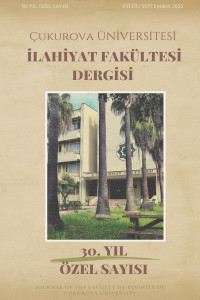FAHRÜDDÎN ER-RÂZÎ’NİN (ÖL. 606/1210) MEFÂTÎHU’L-ĞAYB TEFSİRİNDE EĞİTİMLE İLGİLİ BAZI KAVRAMLAR
Eğitim, insanı yönlendirerek onda istenilen yönde değişim meydana getirme amacı gütmektedir. Tarihsel süreçte bu değişimi vurgulamaya dönük çok sayıda kavram kullanılmıştır. Klasik kaynaklardan hareketle bu kavramların tespit edilmesi, genelde din eğitimi özelde İslâm eğitim tarihi açısından önem arz etmektedir. Bu kaynaklardan bazıları hassaten eğitimle ilgili olmakla birlikte diğer bazısı doğrudan eğitime dair değildir. Ancak bu tarz kaynaklarda da eğitimle ilgili kavramlara yer verildiği görülmektedir. Bu minvalde sözü edilecek eserlerden biri Fahrüddîn er-Râzî’nin (öl. 606/1210) Tefsîrü’l-Fahri’r-Râzî/et-Tefsîru kebîr/Mefâtihü’l-ğayb adlı tefsiridir. Râzî’nin bilhassa Allah’ın terbiye etmesi, eğitmesi ve öğretmesi söz konusu olduğunda eğitimle ilgili kavramlara yer verdiği görülmektedir. Bu nedenle çalışma, Râzî’nin âyetleri tefsir ederken eğitim ve öğretimle ilgili değindiği kavramların ortaya konulmasını amaçlamaktadır. Bu bağlamda bilgiler öncelikle Râzî’nin mezkûr tefsirinden hareketle elde edileceği için çalışma, bu eserle sınırlandırılmıştır. Neticede Râzî’nin tefsirinde eğitim, öğretim ve daha özelde insanın dinî ve ahlâkî eğitimine dair farklı kavramlara (terbiye, edeb/te’dîb, ta‘lîm, tehzîb, tezkiye vs.) yer verildiği tespit edilmiştir. Bu kavramlardan bazıları (terbiye gibi) sadece insandan insana değil, Allah’tan insana doğru bir eğitim sürecini vurgulamaktadır
Some Concepts Related to Education in Fahruddin er-Razi’s (d. 606/1210) Mafâtîhu’l-Ghayb Commentary
Education aims to change people in the desired way by directing them. In the historical process, many concepts have been used to emphasize this change. The determination of these concepts based on classical sources is important in terms of religious education in general and the history of Islamic education in particular. Some of these resources are specifically related to education, while others are not directly related to education. However, it is seen that concepts related to education are also included in such sources. One of the works that will be mentioned in this regard is Fahruddîn er-Râzî’s (d. 606/1210) tafsîr named Tafsîru’l-Fahri’r-Râzî/at-Tafsîru kabîr/Mafâtihu’l-ghayb. It is seen that Razî gives place to the concepts related to education, especially when it comes to the training, education and teaching of Allah. For this reason, the study aims to reveal the concepts that Razî mentioned about education and training while interpreting the verses. In this context, the study is limited to this work, as the information will be obtained primarily from Razî’s commentary on the aforementioned. As a result, it has been determined that in Razî’s tafsîr, different concepts related to education, training and more specifically the religious and moral education of human beings (tarbiyah, adab/ta'dîb, ta‘lîm, tahzîb, tazkiyah etc.) are included. Some of these concepts (such as tarbiyah) emphasize a process of education not only from human to human, but from Allah to human.
___
- Attâs, M. Nakib el-. İslami Eğitim. İstanbul: Endülüs Yayınları, 1991.
- Attâs, M. Nakib el-. İslâm, Sekülerizm ve Geleceğin Felsefesi. çev. Mahmud Erol Kılıç. İstanbul: İnsan Yayınları, 2016.
- Ayverdi, Sâmiha. “Mürebbiye”. http://lugatim.com/s/M%C3%BCrebbiye (Erişim Tarihi: 02. 08. 2022).
- Beydâvî. Envârü’t-tenzîl ve esrârü’t-te’vîl. 5 Cilt. thk. Muhammed Abdurrahman el-Maraşlî. Beyrut: Dâru İhyâi’t-Turâsi’l-Arabî, t.s.
- Bilgin, Beyza. Eğitim Bilimi ve Din Eğitimi. Ankara: Gün Yayıncılık, 1998.
- Dodurgalı, Abdurrahman. Din Eğitimi ve Öğretiminde İlkeler ve Yöntemler. İstanbul: Marmara Üniversitesi İlahiyat Fakültesi Yayınları, 1999.
- Gazali. Mîzânü’l-‘amel. thk. Süleymân Dünyâ. Kahire: Dârü’l-Me‘ârif, 1964.
- Gazali. Eyyyühe’l-veled. nşr. Merkezu Dâri’l-Minhâc li’d-Dirâsât. Beyrut: Dârü’l-Minhâc, 2. Baskı, 1435/2014.
- Gündüz, Turgay. İslâm, Gençlik ve Din Eğitimi. Bursa: Düşünce Kitabevi, 2002.
